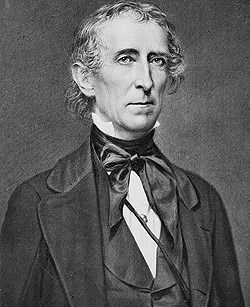
On March 2nd, 1861, delegates arrived at Montgomery, Alabama, to open the first session of the Confederate Congress. Every state in the new Confederacy was represented: South Carolina, Georgia, Florida, Mississippi, Alabama, Louisiana, and Texas. Enthusiasm and excitement permeated the air of Montgomery. The Confederate Congress unanimously adopted the Constitution of the Confederacy. It was similar to the United States Constitution except a few major differences. The President served a single six year term, and it guaranteed the right to own slaves. The Confederate government also sent agents to England to seek foreign recognition and aid. It soon became painfully apparent that the small city of Montgomery (population 8,800) could not handle the massive flood of people. It also suffered from poor rail connections, especially to the west. On the 4th, President Abraham Lincoln gave his Inaugural address in Washington, DC. He emphasized that he hoped to avoid war, and that common bonds would overcome the current crisis. In Texas, Confederate troops continued to take over U.S. military forts. On the 16th, at Mesilla in the Arizona Territory, citizens voted to join the Confederacy. The government in Montgomery accepted the Arizona Territory as part of the Confederacy. In Washington, a last ditch Senate Peace convention led by Kentucky’s John Crittenden failed to reach a compromise. Both the Senate and House rejected it, as did Lincoln. The plan called for Constitutional Amendments that allowed slavery to exist permanently in the South, and in the Southwest. In the meantime, pressure was building on both sides to deal with the Fort Sumter issue. Confederate commanders made plans to bombard it, while Lincoln and his advisors discussed whether to hold onto the isolated fort or abandon it. Preserving the fort, in the midst of Confederate territory, was a symbol of Union control and a matter of principle for the President. Another peace conference in Washington failed to produce any results. Led by former president (and Virginian) John Tyler, it did not get much support from either Republicans or southern Democrats, many of whom were now bracing for conflict. On March 2nd it failed to pass in Congress. The proposal included a 13th Amendment to the Constitution which would guarantee slavery forever where it existed, and extending the Missouri Compromise Line all the way to the Pacific Ocean, dividing free and slave territory. More than 100 of the leading politicians of the day backed this plan. It was rejected in the Senate and the House of Representatives never considered it. With two failed compromises, involving the major political leaders of all factions, the nation was exasperated. No other compromises were in sight. Susan Blackford of Lynchburg wrote that “the whole course of ordinary life was changed. All our usual avocations were at an end, and a new life began for women and well as men. The sound of the drum and fife could be heard from morning until night. The men were drilling and equipping themselves with the accoutrements of war, while the women, with tearful eyes and saddened hearts, spent their time making coats and pantaloons, shirts…”
|
Last updated: March 31, 2012
